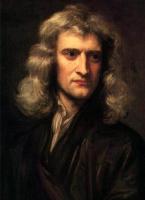| www.tmatlantic.com
Test & Soldering Equipment On-line Store |
|
D.E.V.I.C.E. (Wiki)Calculators Services |
|||||
Filter by first letter
|
Newton, Isaac
Sir Isaac Newton (25 December 1642 – 20 March 1727) was an English physicist and mathematician who is widely regarded as one of the most influential scientists of all time and as a key figure in the scientific revolution. His book Philosophiж Naturalis Principia Mathematica ("Mathematical Principles of Natural Philosophy"), first published in 1687, laid the foundations for most of classical mechanics. Newton also made seminal contributions to optics and, as mathematician, he shares credit with Gottfried Leibniz for the invention of the infinitesimal calculus.
Newton's Principia formulated the laws of motion and universal gravitation that dominated scientists' view of the physical universe for the next three centuries. It also demonstrated that the motion of objects on the Earth and that of celestial bodies could be described by the same principles. By deriving Kepler's laws of planetary motion from his mathematical description of gravity, Newton removed the last doubts about the validity of the heliocentric model of the cosmos. The SI unit of force is the newton, named in Newton's honour. Newton built the first practical reflecting telescope and developed a theory of colour based on the observation that a prism decomposes white light into the many colours of the visible spectrum. He also formulated an empirical law of cooling and studied the speed of sound. In addition to his work on the calculus, as a mathematician Newton contributed to the study of power series, generalised the binomial theorem to non-integer exponents, and developed Newton's method for approximating the roots of a function.
Newton was a fellow of Trinity College and the second Lucasian Professor of Mathematics at the University of Cambridge. He was a devout but unorthodox Christian and, unusually for a member of the Cambridge faculty, he refused to take holy orders in the Church of England, perhaps because he privately rejected the doctrine of trinitarianism. In addition to his work on the mathematical sciences, Newton also dedicated much of his time to the study of alchemy and biblical chronology, but most of his work in those areas remained unpublished until long after his death. In his later life, Newton became president of the Royal Society. He also served the British government as Warden and Master of the Royal Mint. |
|
Site mapPrivacy policyTerms of Use & Store PoliciesHow to BuyShippingPayment |

























